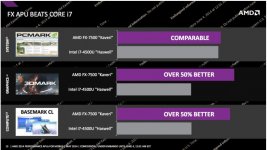Scali
Veteran Member
So if you needed performance for H.264 encoding, but wanted to play games too - an 8 core FX is probably a damn good option.
Again, I disagree.
The whole reason I wrote that blog is because of the multicore myth.
The 8-core FX isn't faster than Intels with 4 cores by default just because it has more cores.
Especially when you also throw HT into the mix. In most multithreaded tasks, the Intels still come out on top, even with less cores. Simply because those cores are that much faster.
And in a few cases the Intels may be a smidge slower than the 8-cores... but well, they are much faster in games and most other tasks, so it's all about your priorities.
I think in general it's pretty difficult to make a good case for AMD's CPUs in terms of performance. They're very similar to the Pentium 4 in many ways. The Pentium 4 was pretty much a one-trick-pony as well, with its SSE2. Optimized applications (mostly video encoders and 3d renderers in practice) were incredibly fast on the Pentium 4 (even outperforming the early Core2 Duos in some cases), but they were horrible in everything else... and very powerhungry to boot.

